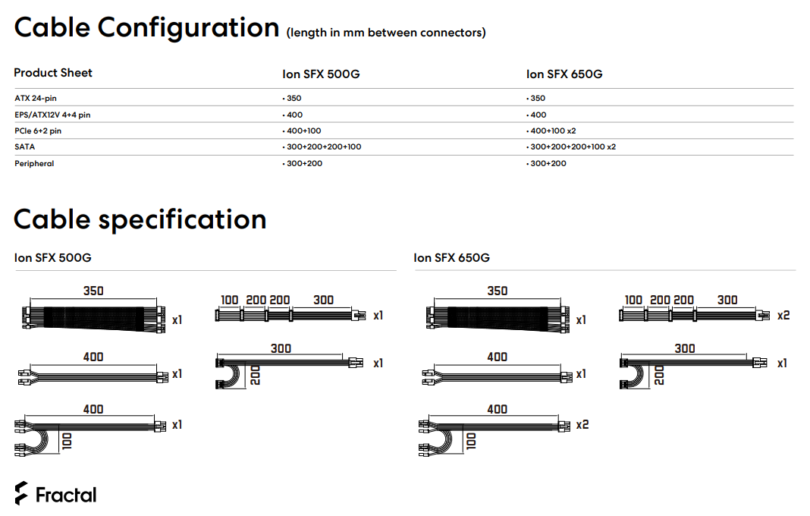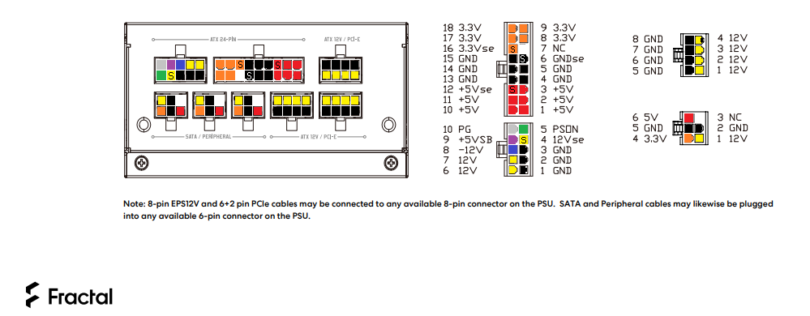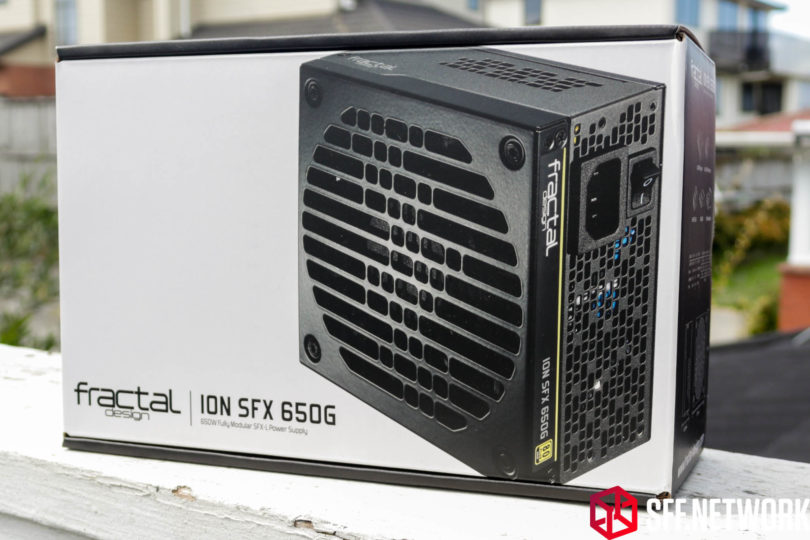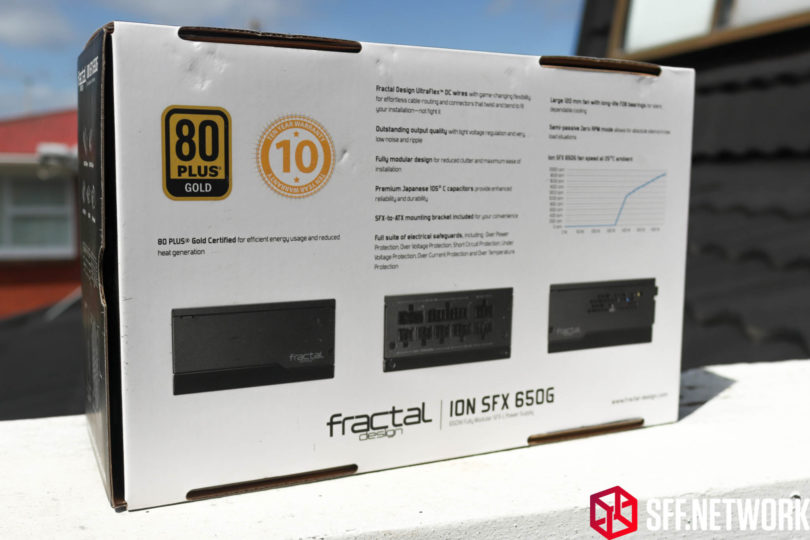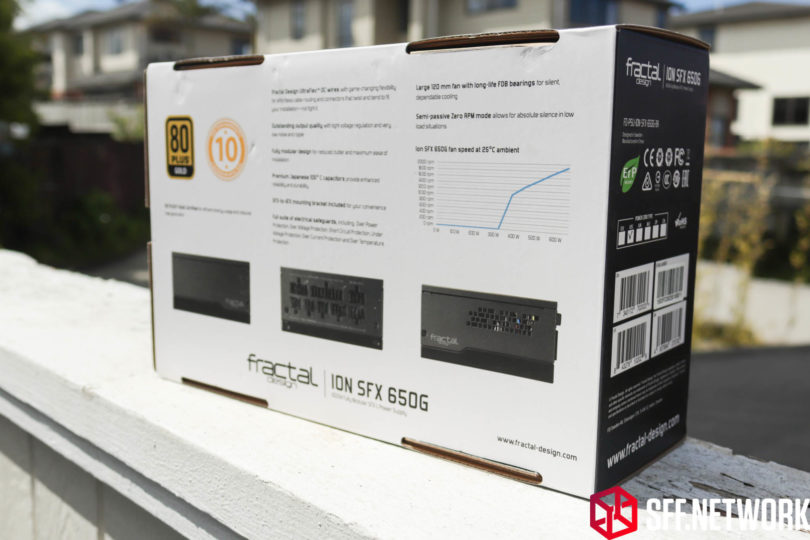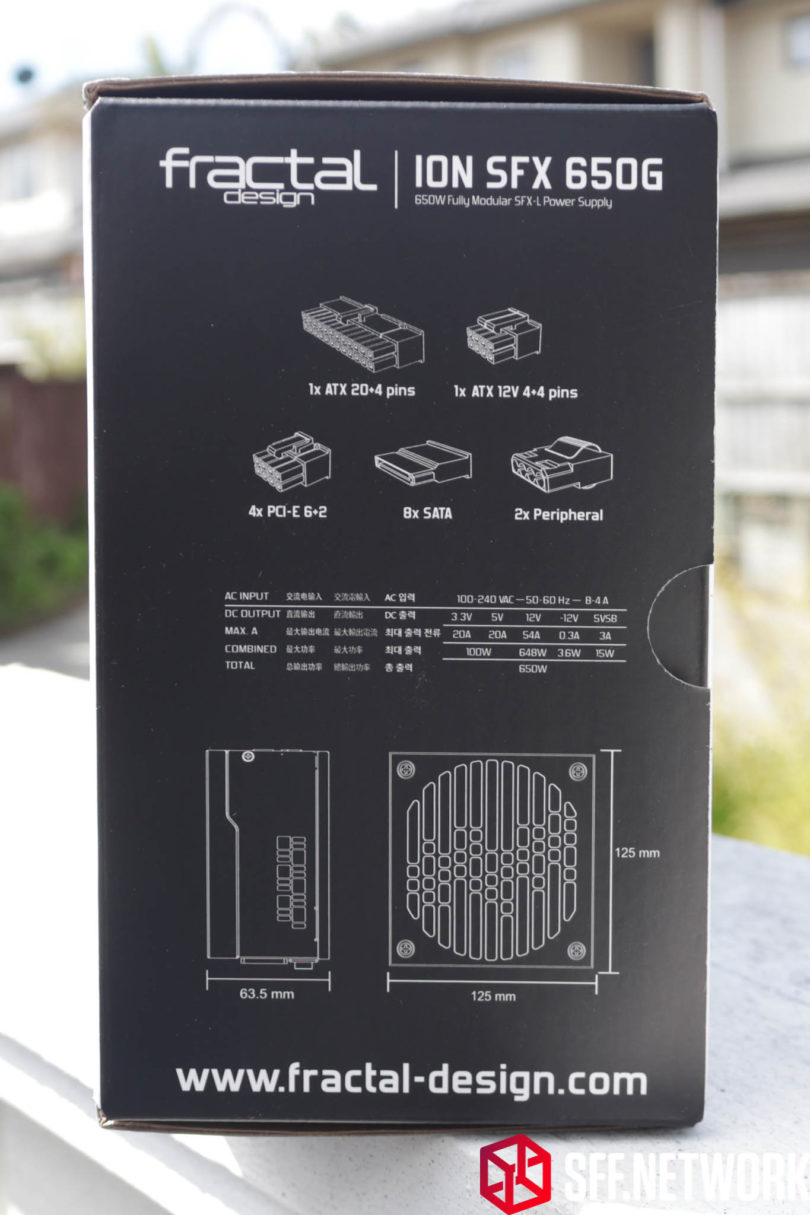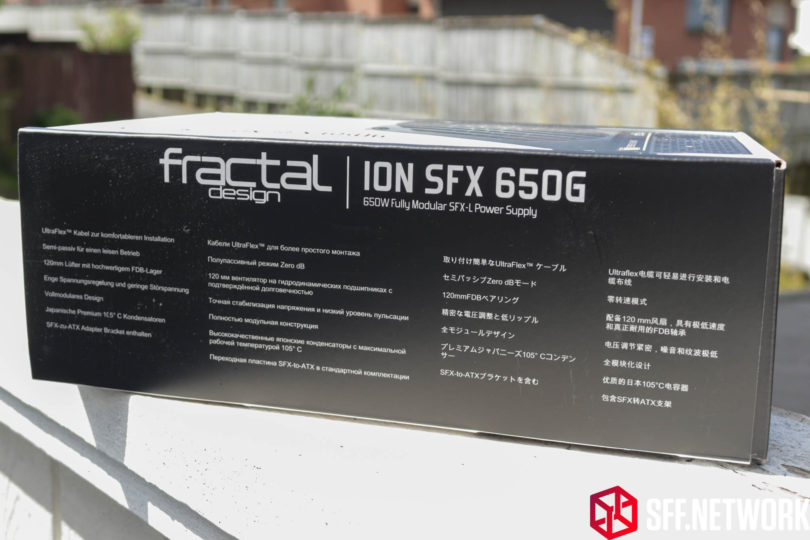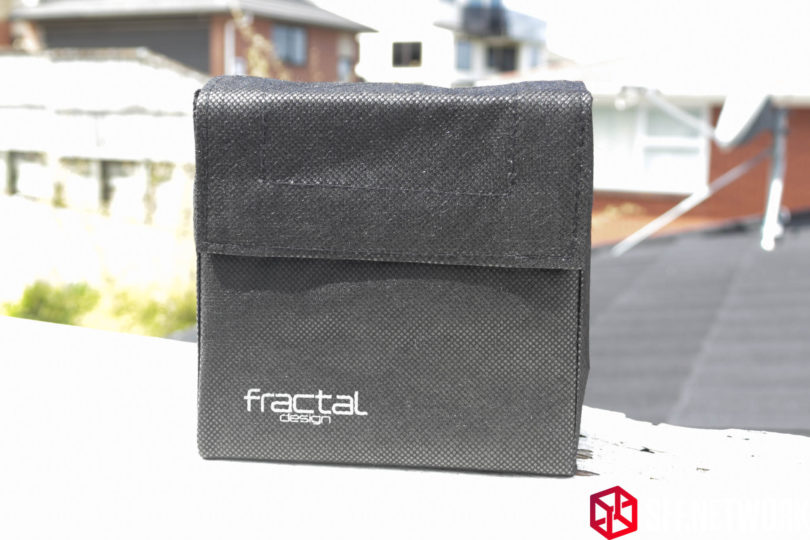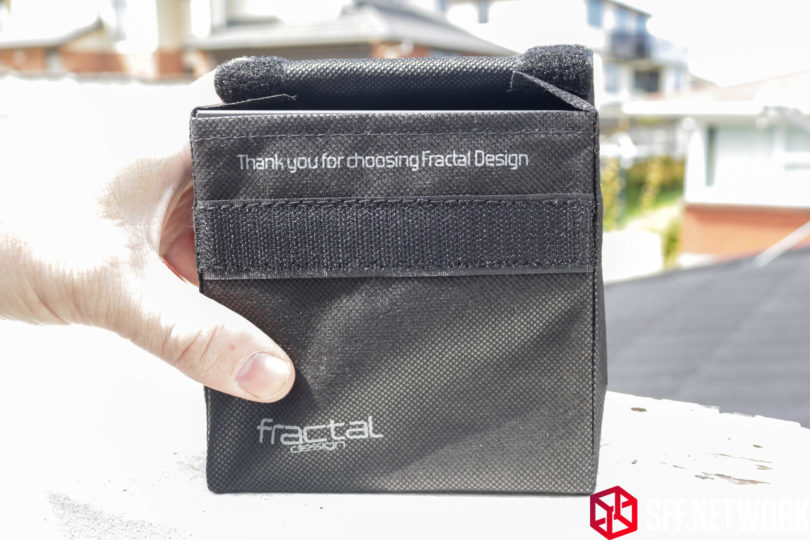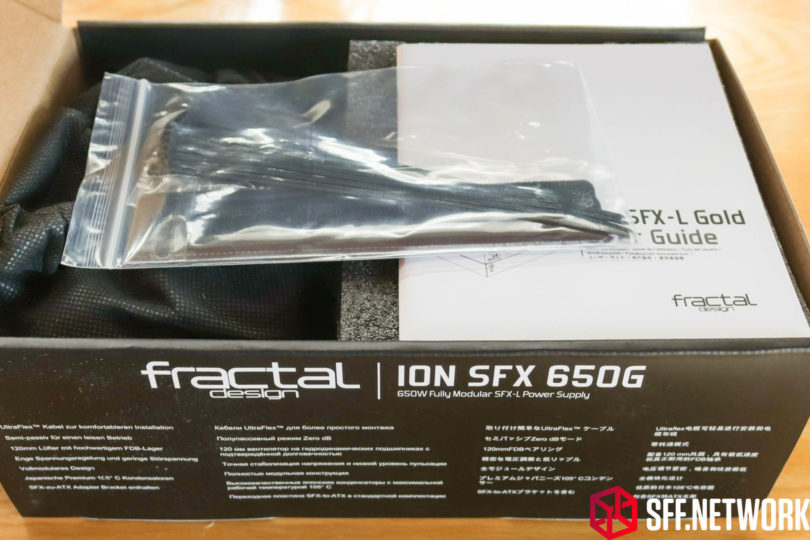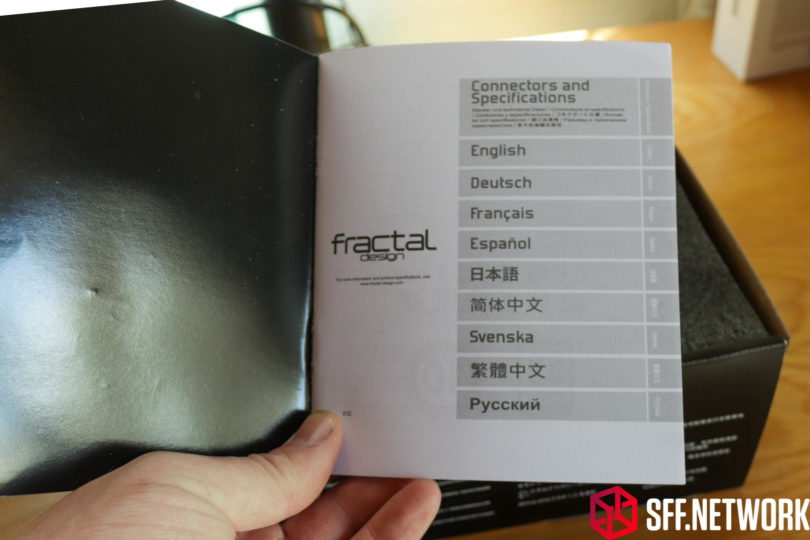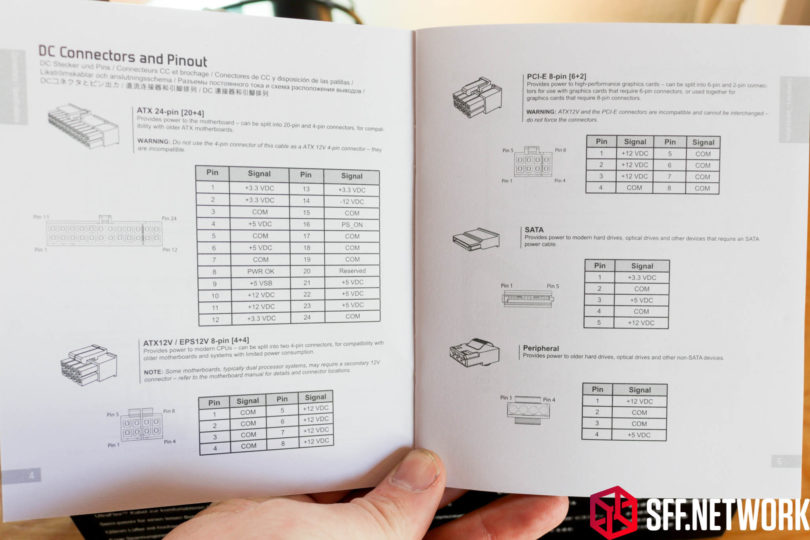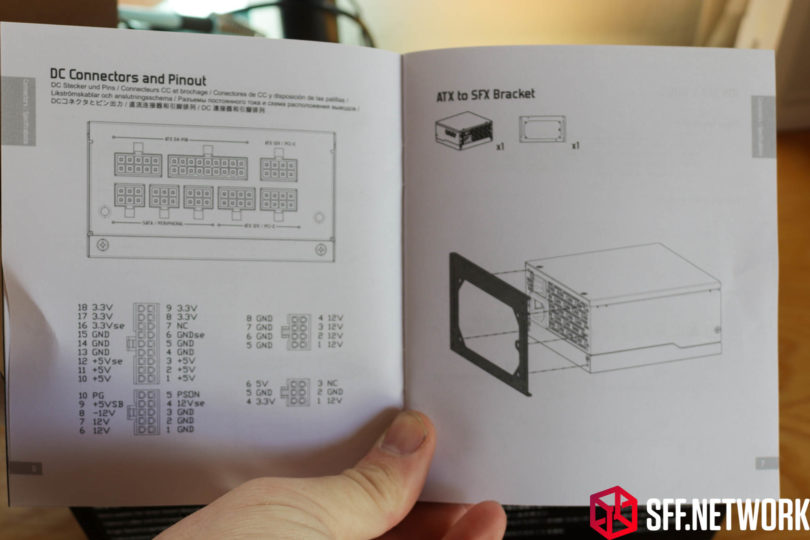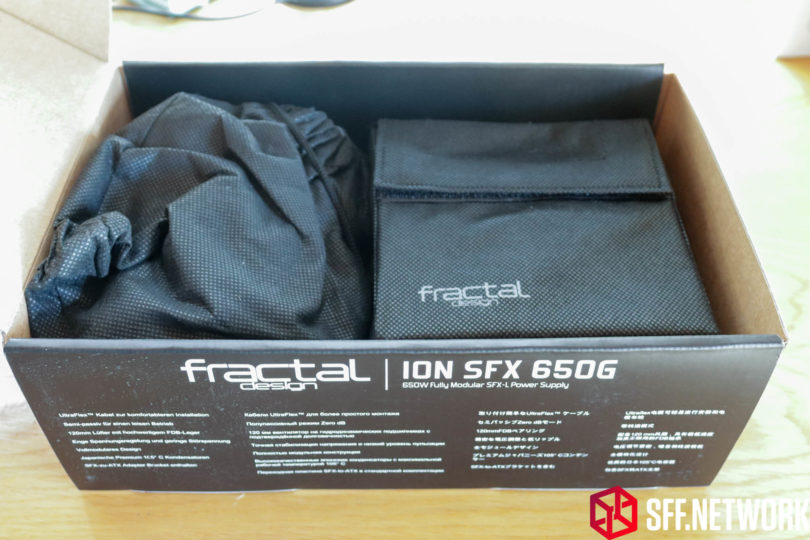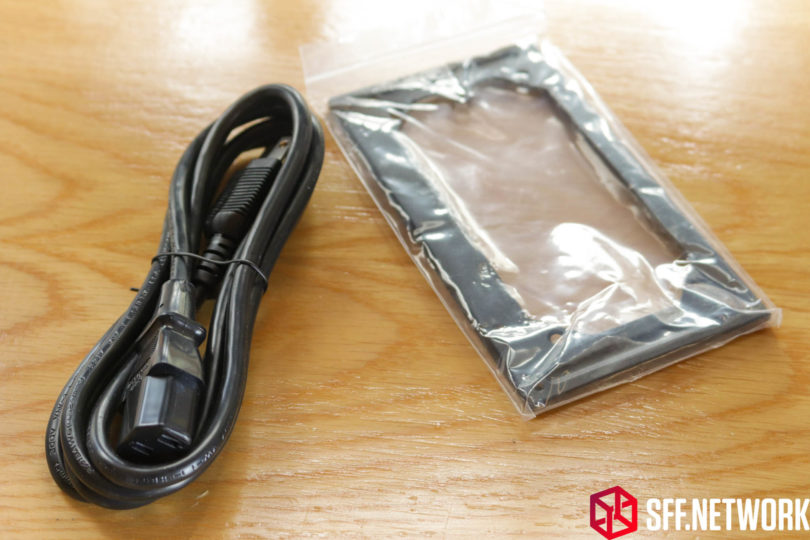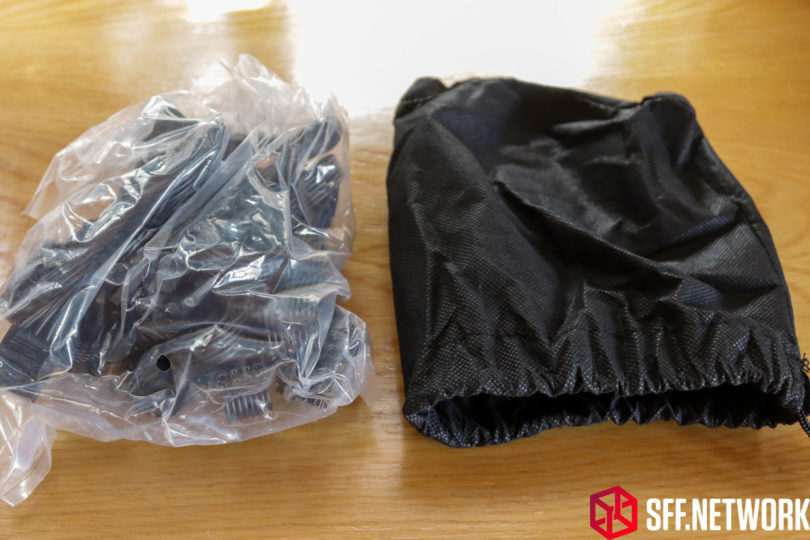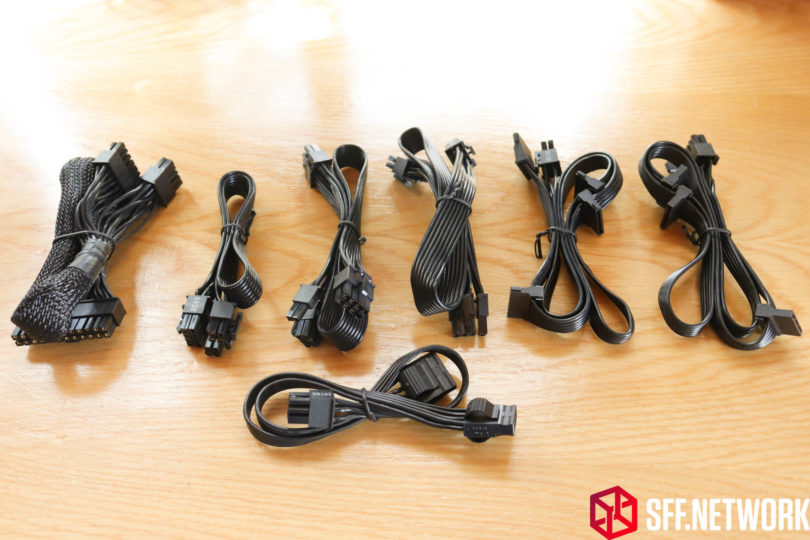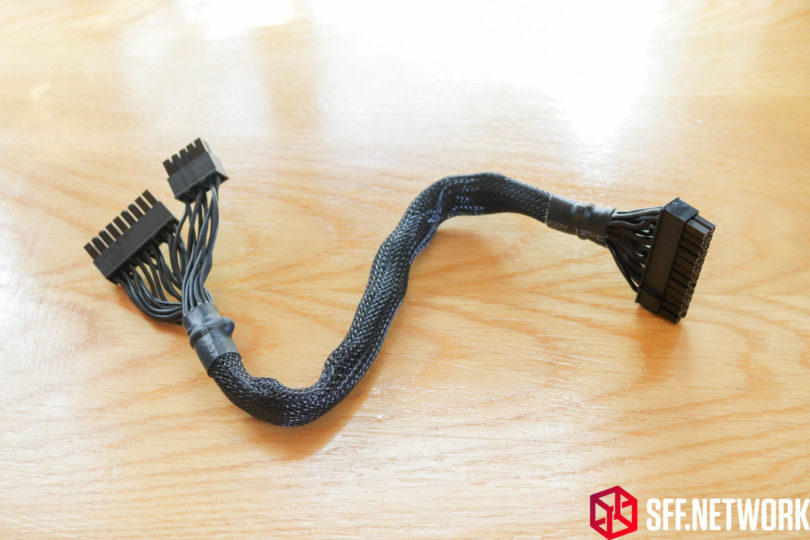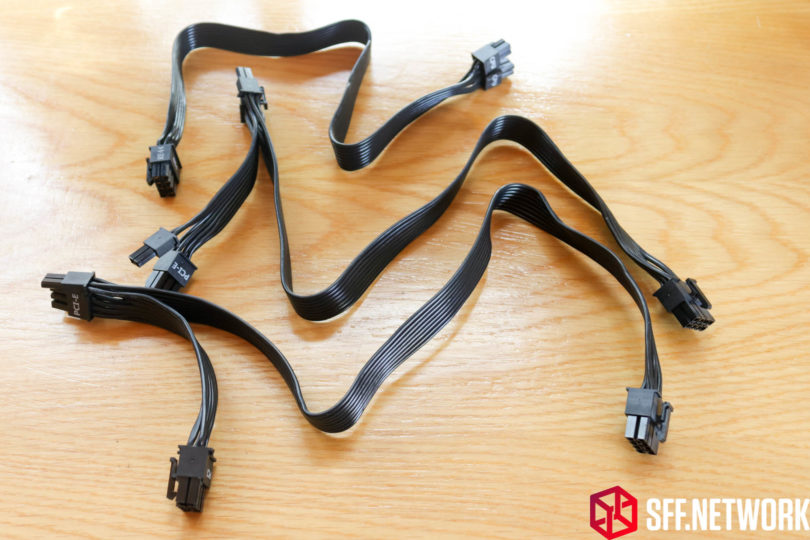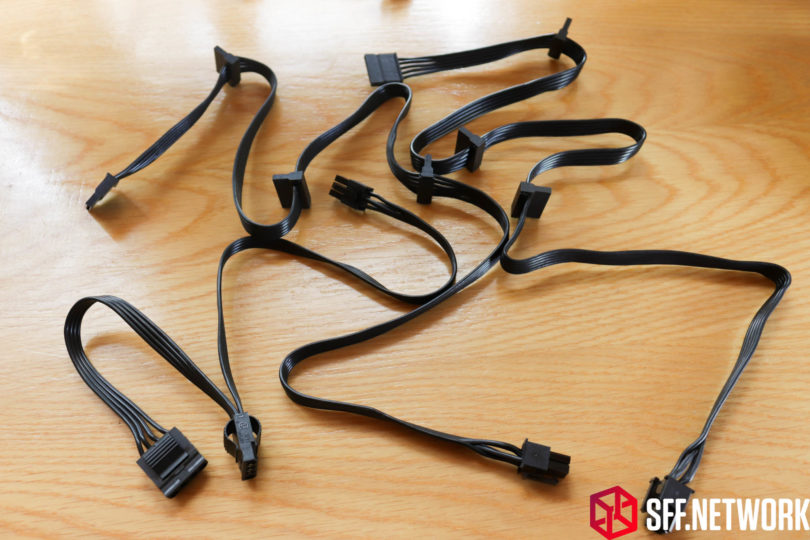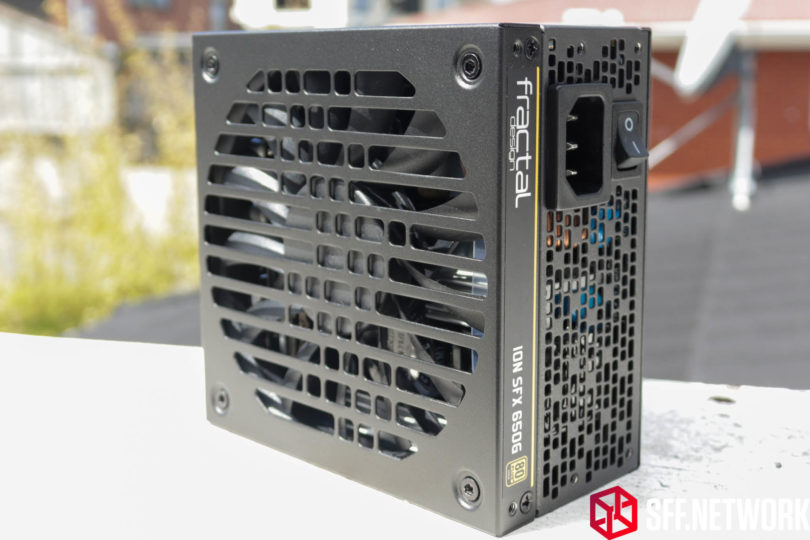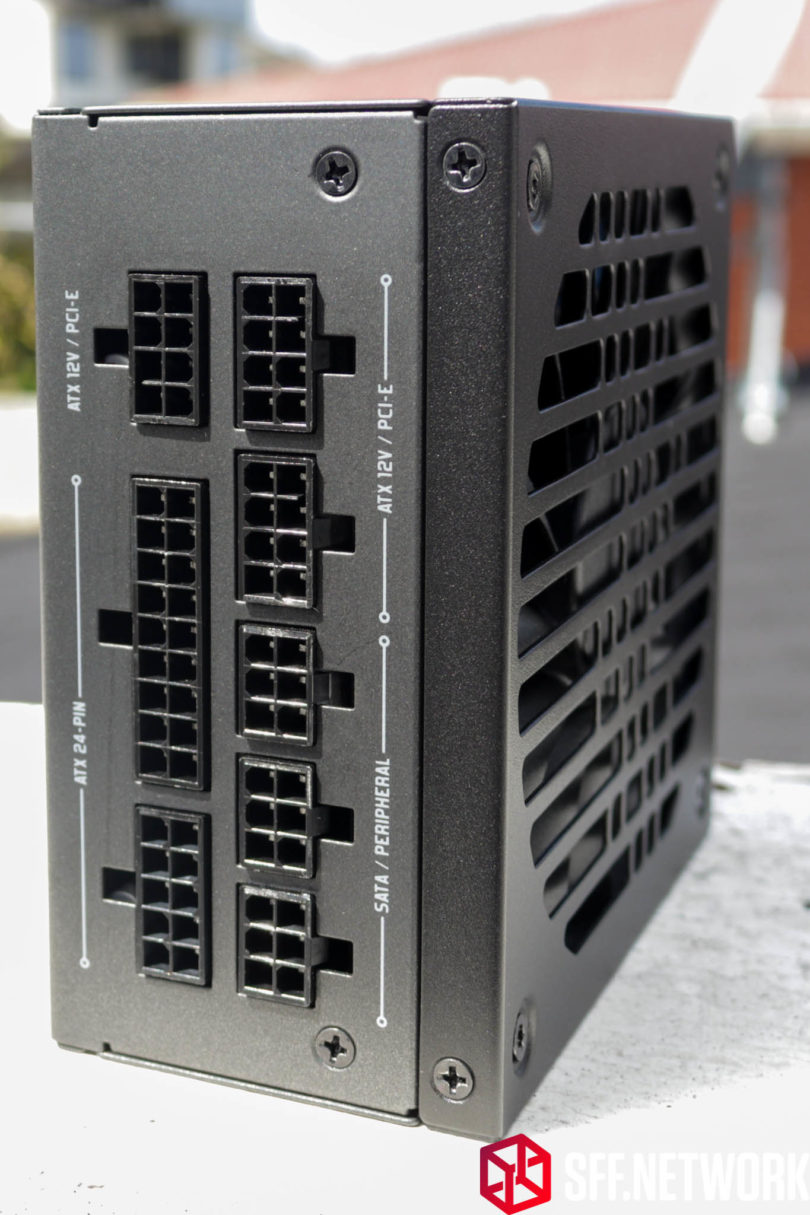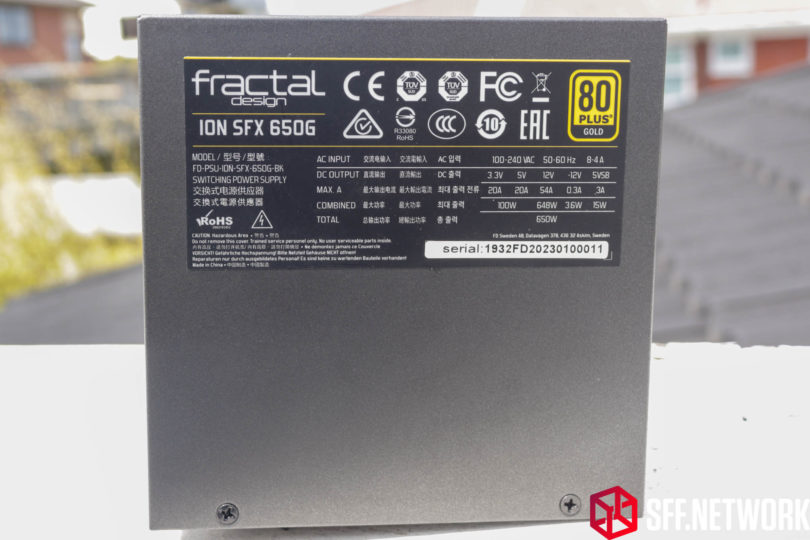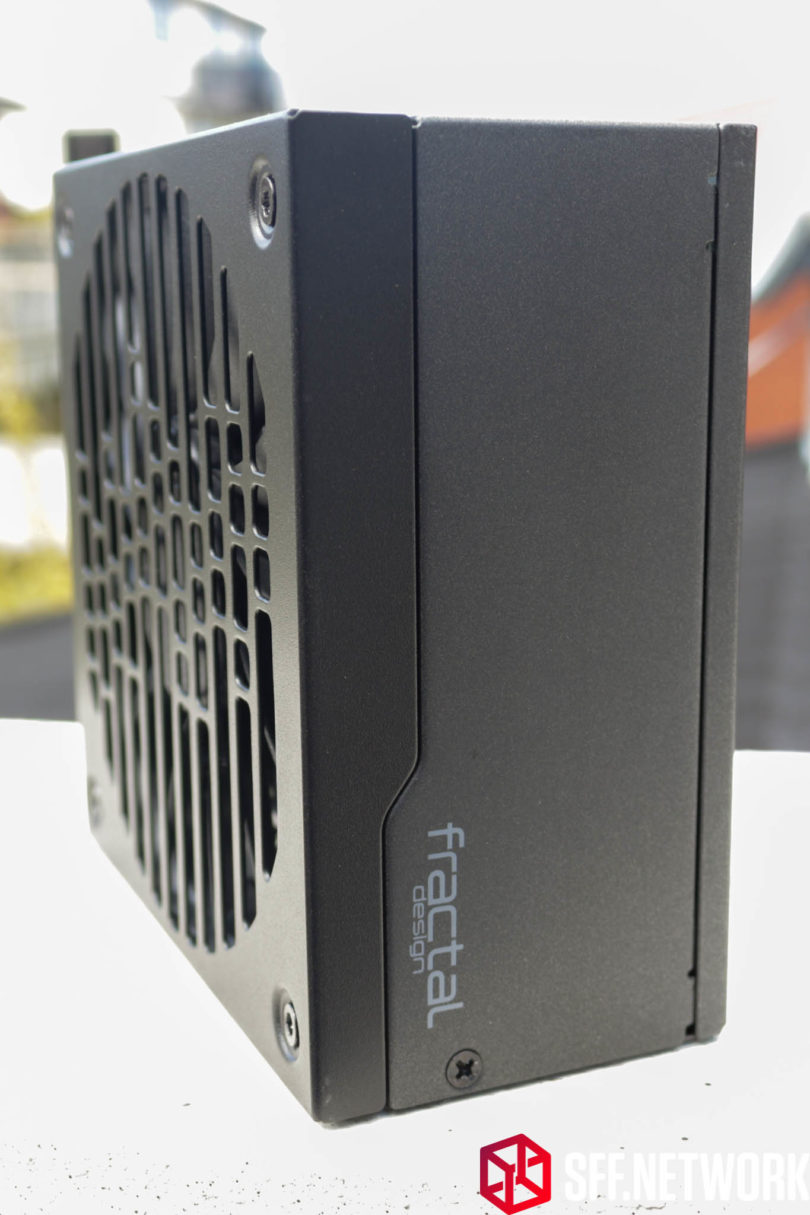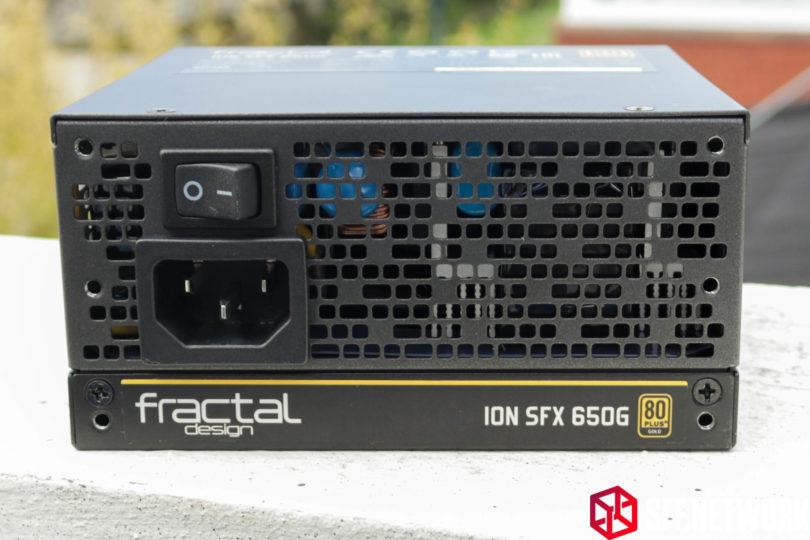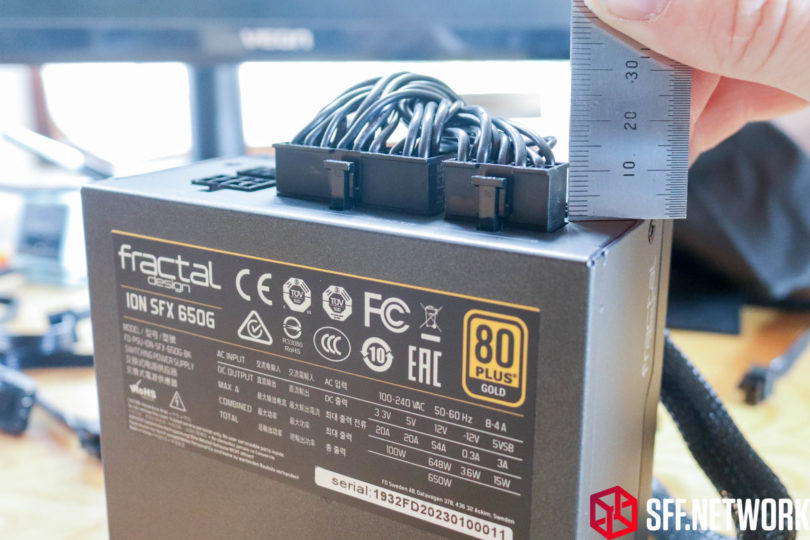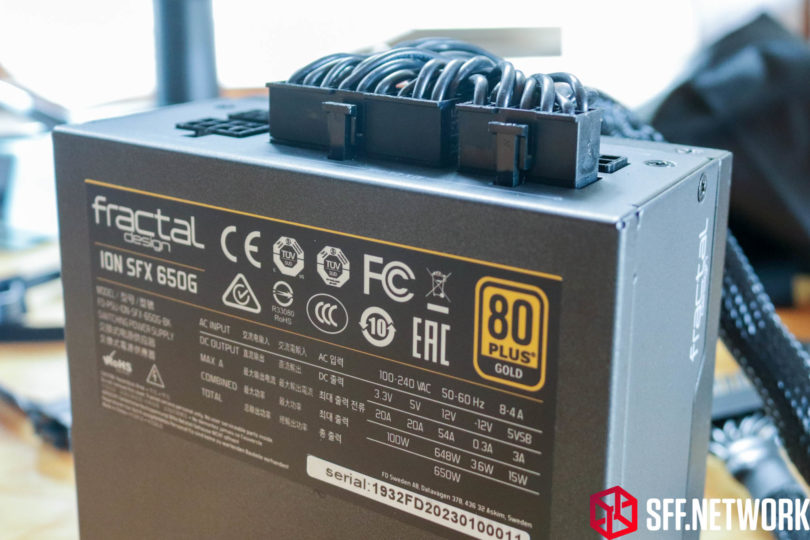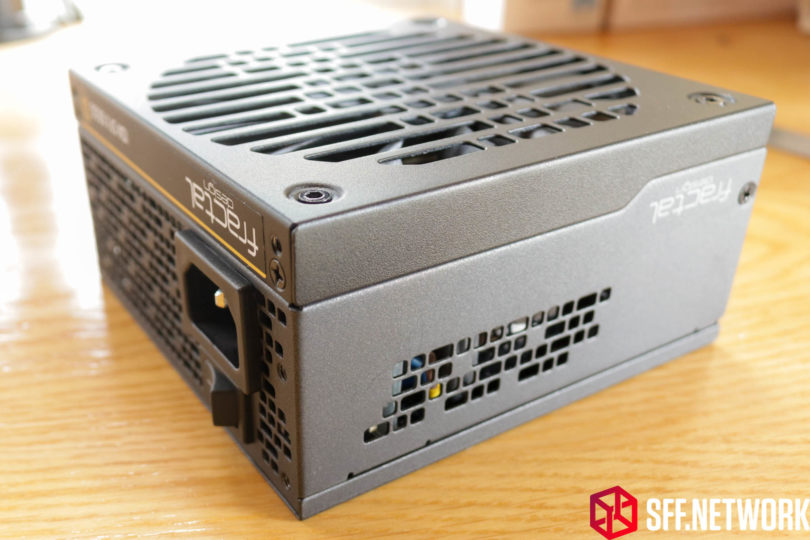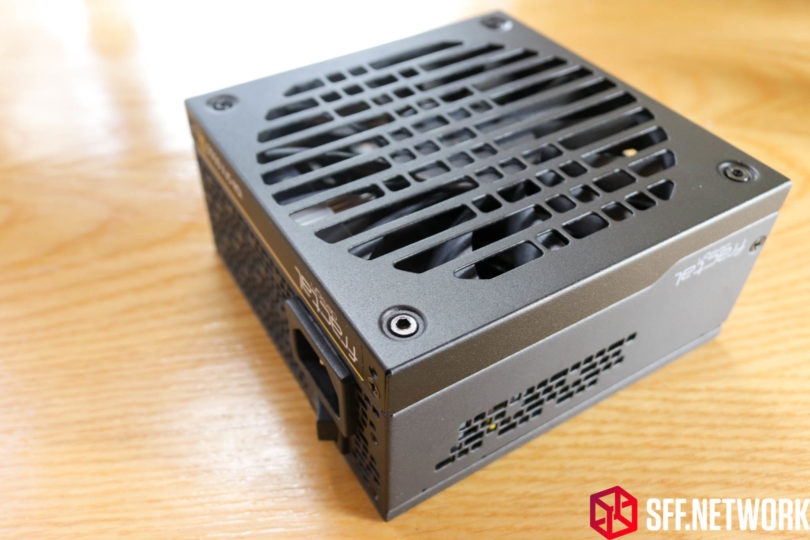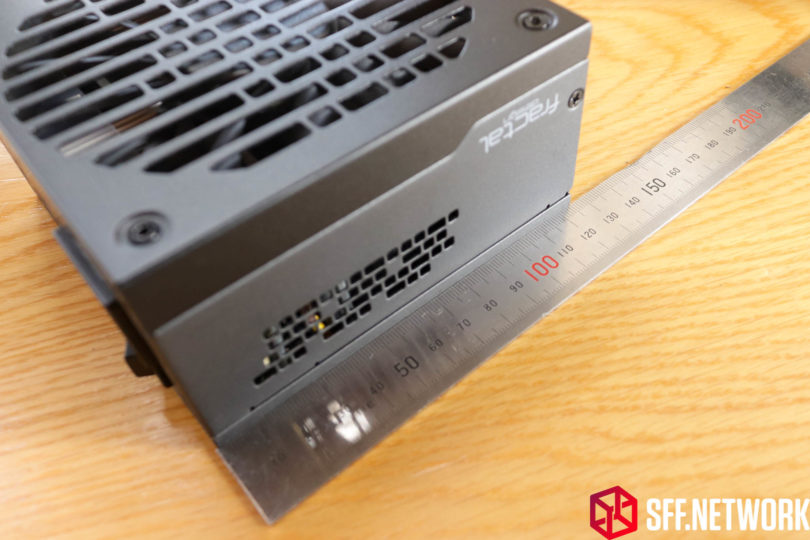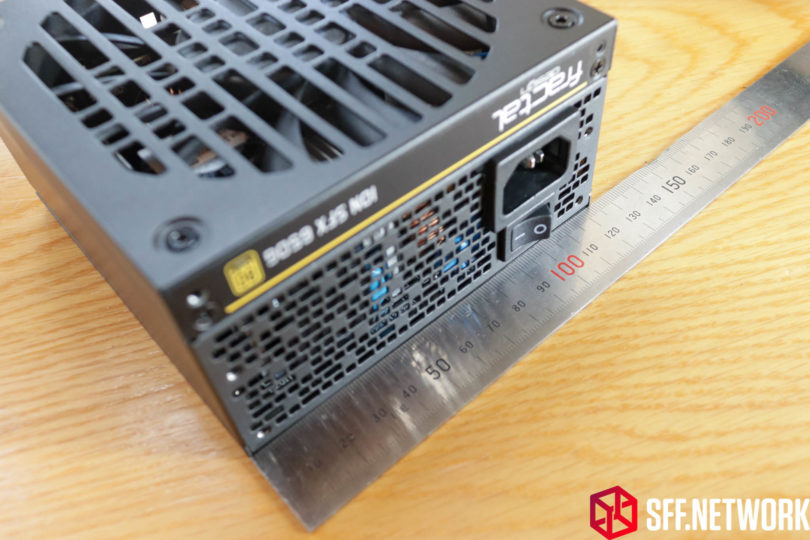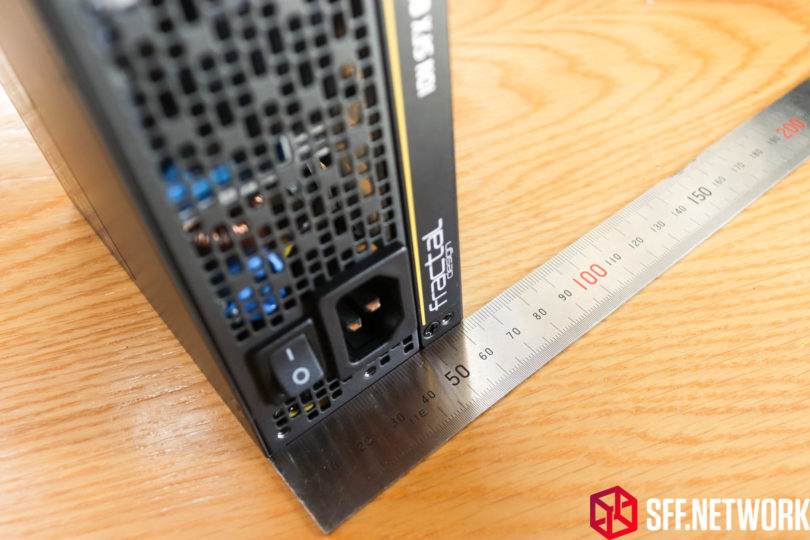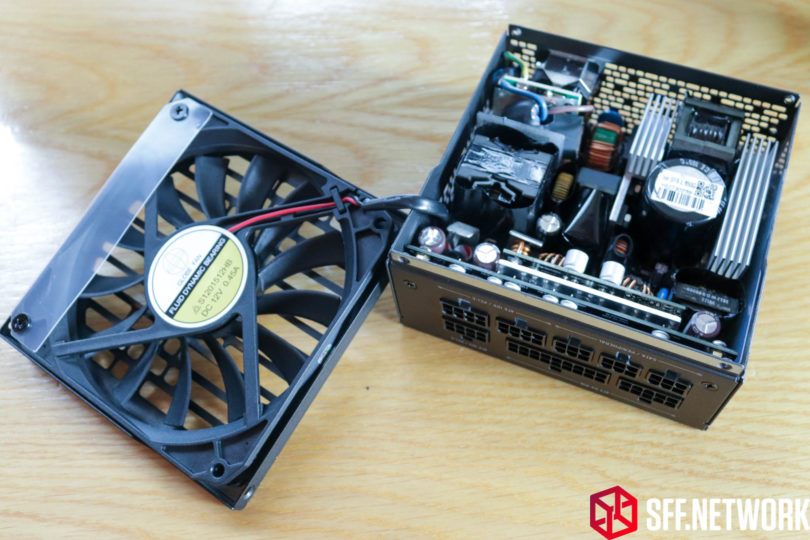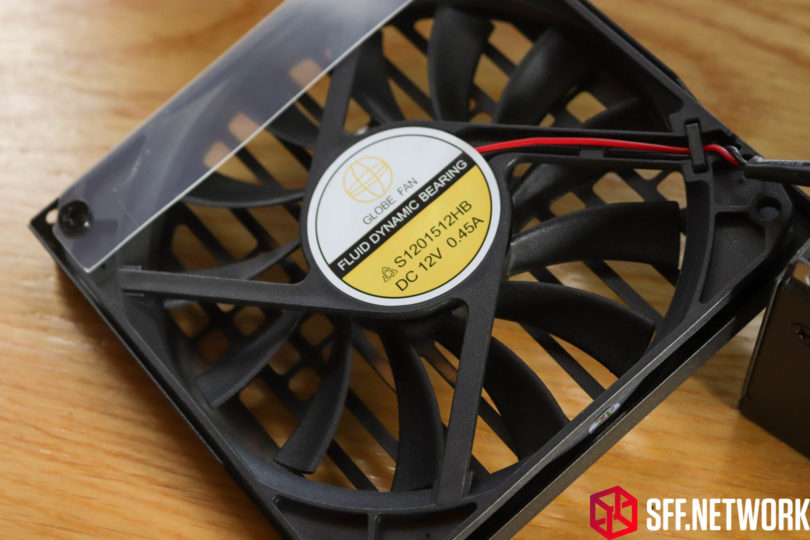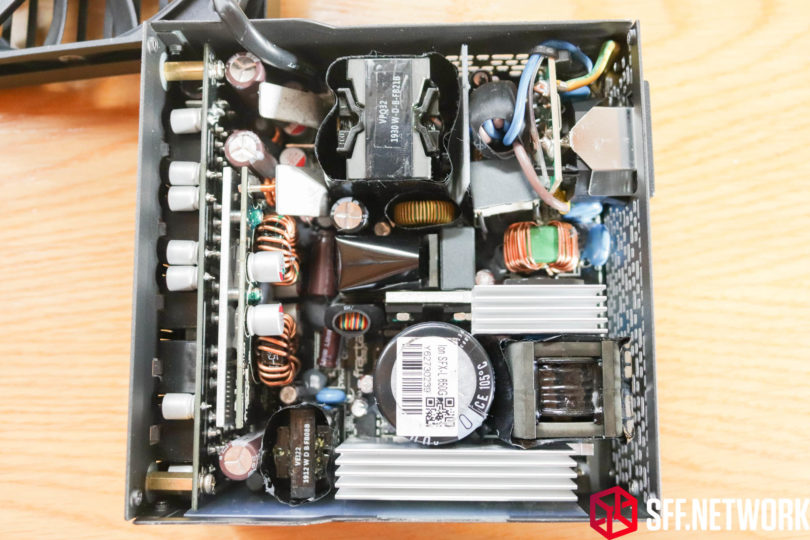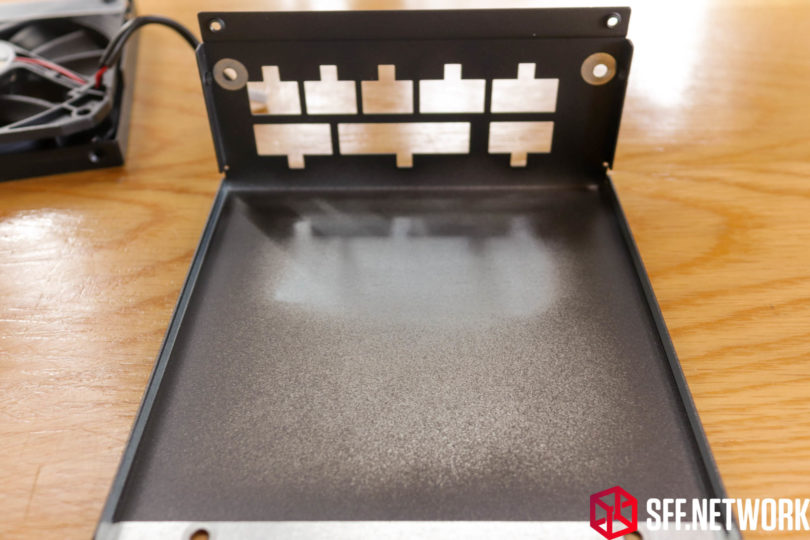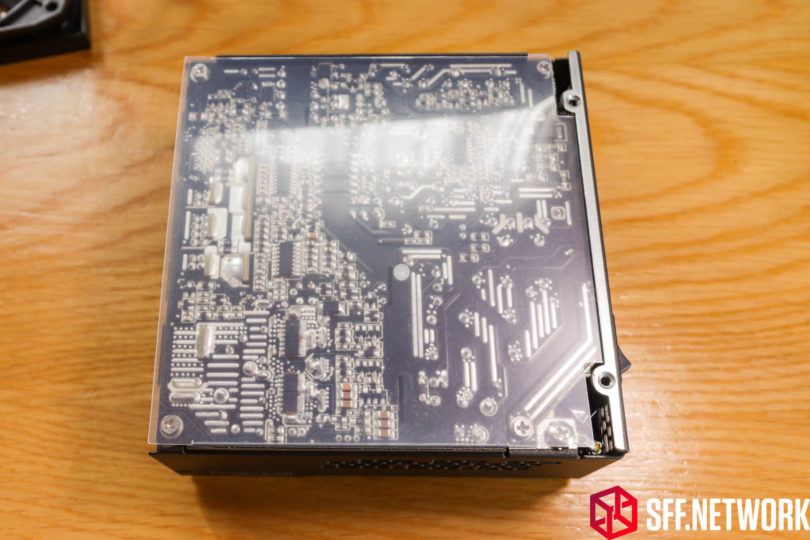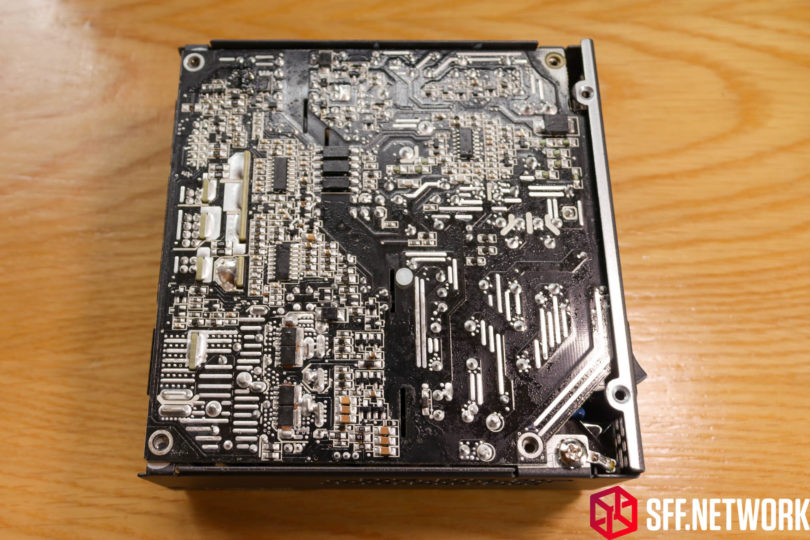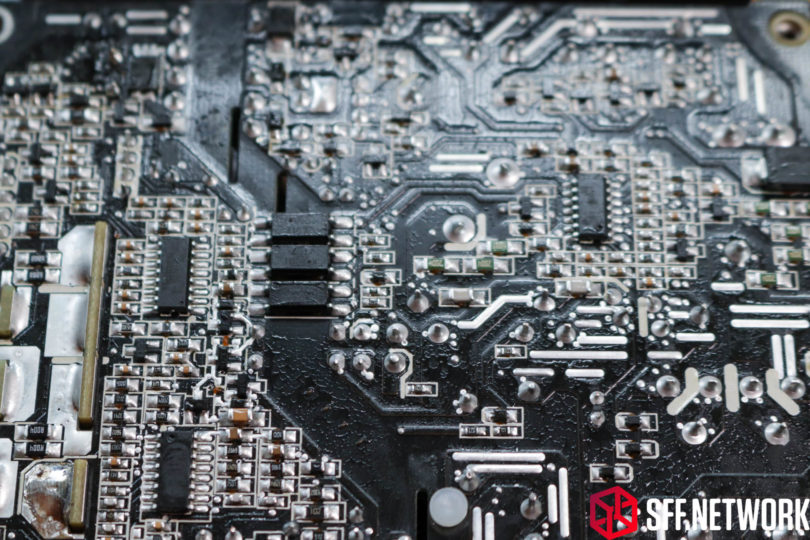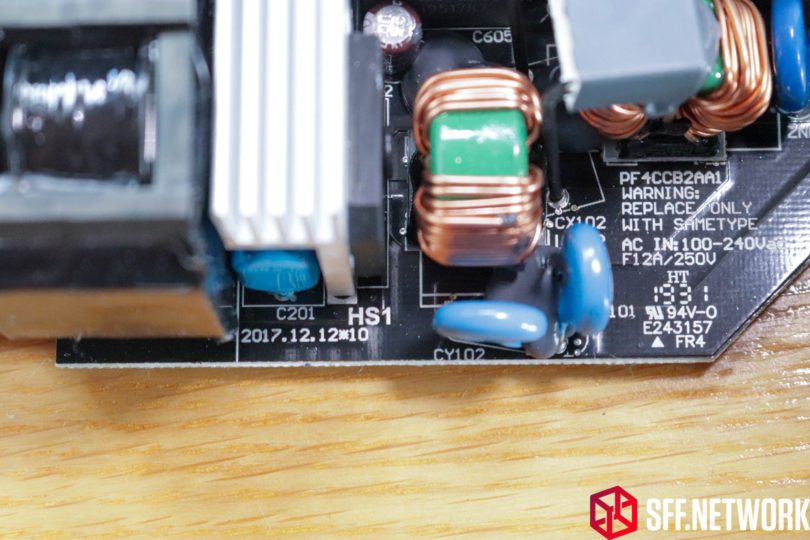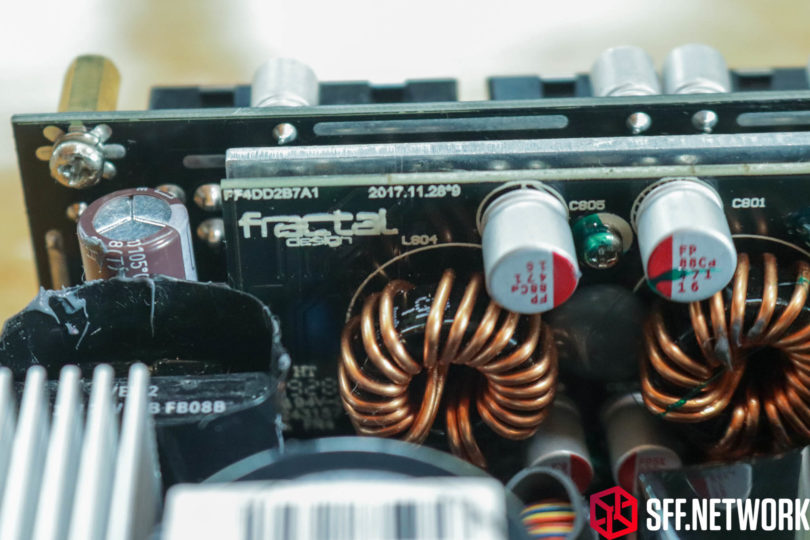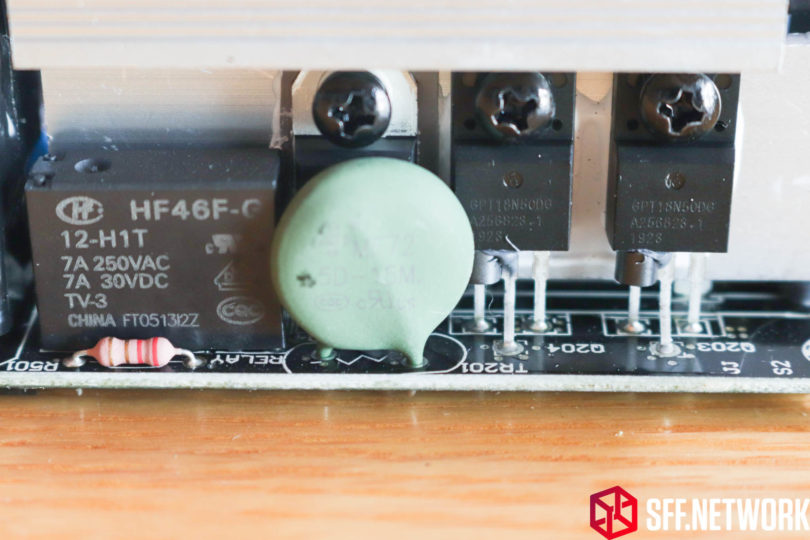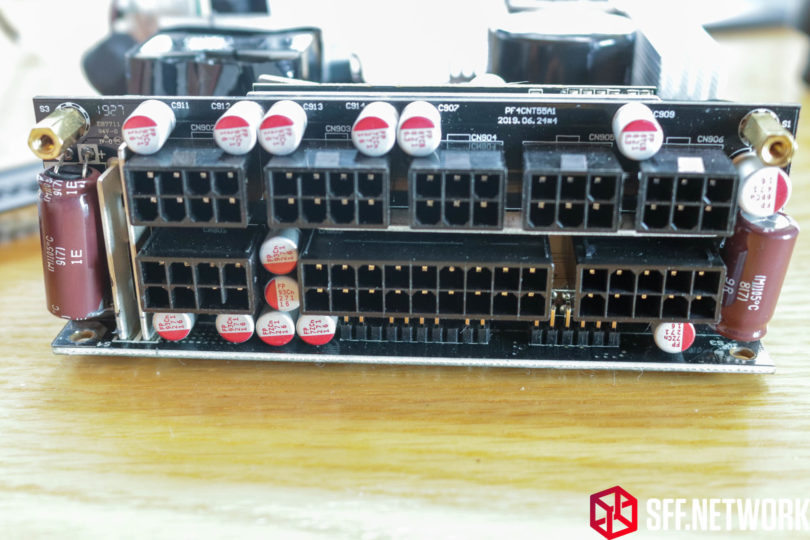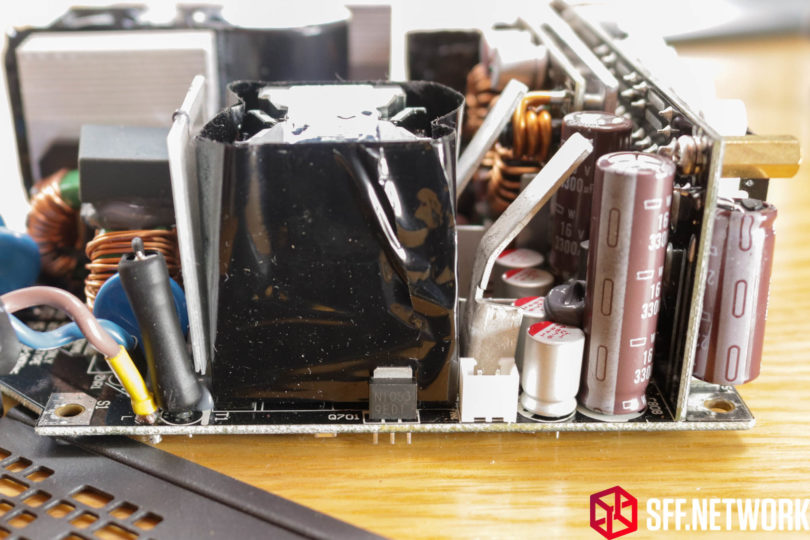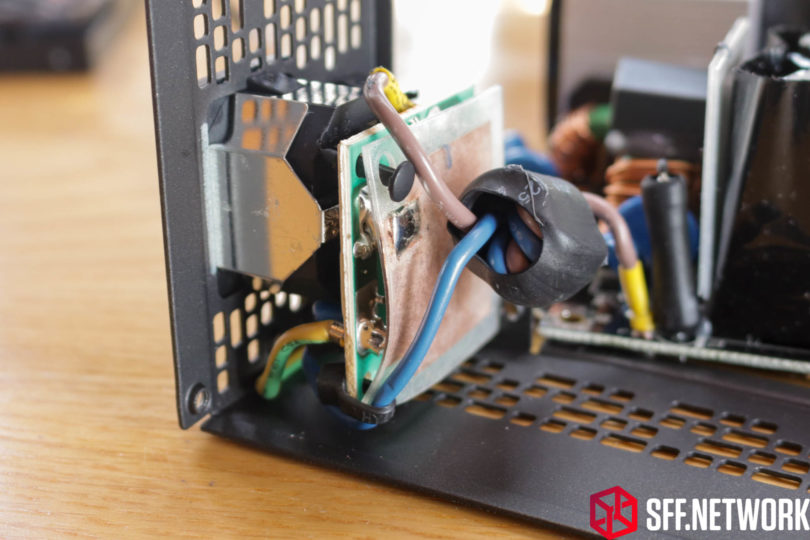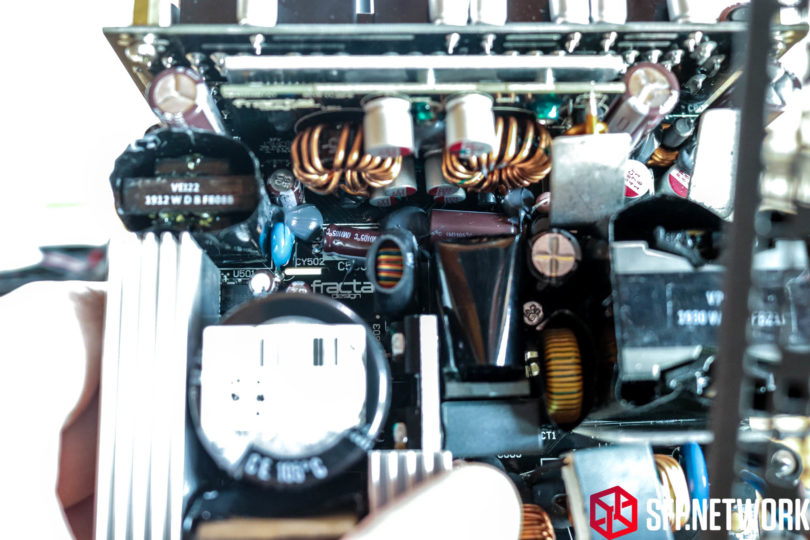Fractal Design, no stranger to the SFX(-L) market (including a 450w Integra SFX unit with their Node 202 chassis), has decided to dive a little deeper into our world. Today, Fractal Design launches the new Ion SFX-L range with a pair of units hitting shelves at 500W and 650W spec levels. We have the 650W unit on the test bench today – let’s put it to the test!
Table of Contents
A disclaimer first before we get started: SFF Network does not possess the expertise or equipment to fully test the electrical performance of PC power supplies, and as such, this article should not serve as the sole data point in determining whether to purchase this product. We’ll be able to contextualise the utility and experience of using this unit with others in the market place, but we’d suggest having our own review supplement those by others who have the hardware and capability to do more thorough analysis of electrical performance, especially at higher wattages.
The Ion SFX Gold Range – Specs and Pricing
The Fractal Design Ion SFX power supplies both have these as common features;
- 80 Plus Gold Certification
- Fully modular
- 120 x 15mm FDB fan in a semi-passive configuration (semi fanless)
- Max operating temp at full load – 40°C (reduced to 80% at 50°C)
- 105°C Japanese Polymer caps
- MTBF of 100,000 hours at full load
- A SFX-L form factor at 125mm deep
- Braided ATX cable with “Ultraflex” wires
- “Ultraflex” cables for the rest of the loadout
- Over voltage protection
- Under voltage protection
- Over power protection
- Short circuit protection
- Over current protection
- Over temperature protection
- Input voltage 100-240V AC at 50-60Hz
- Input current at 110V/240V: 6A/3A for the 500W and 8A/4A for the 650W
- Single 12V rail
- Standby efficiency ErP 2013 (<0.45W @230 VAC, 45 mA load on +5Vsb)
- Sleep state compliance in C6/C7
- CE, FCC, TUV, cTUVus, EAC, RCM, CCC, BSMI, CB, RoHS, WEEE approvals/certifications
- Dimensions of 125 x 125 x 63.5mm
- Weight of 1.11 kg (500G) / 1.15 kg (650G)
- Warranty of 10 years
Connector-wise, the 500 and 650W variants are replete with the following;
| Ion SFX 50G | Ion SFX 650G | |
| ATX | 1 | 1 |
| EPS/ATX12V | 1 | 1 |
| PCIe (6+2 pin) | 2 (on one cable) | 4 (on two cables) |
| SATA | 4 | 8 |
| Peripheral (Molex) | 2 | 2 |
We all love tables right? This section has a couple of big ones, enjoy!
Here’s the ratings on the DC rails;
| Ion SFX500G | Ion SFX 650G | |
| 3.3V | 20A | 20A |
| 5V | 20A | 20A |
| 3.3V and 5V combined | 100W | 100W |
| 12V | 41A | 54A |
| -12V | 0.3A | 0.3A |
| +5VSB | 3A | 3A |
| Total Output | 500W | 650W |
And here’s the pinout of both units, should you want to create custom cabling; (note that the blank positions are “NC” pins)
Let’s analyse where these new power supplies sit in the market. We’ll look at NewEgg.com’s pricing as at time of writing, being 23 Oct 2019.
| Model | Form Factor | Modular? | Wattage | 80+ | Price (USD, excl shipping) |
| SilverStone SST-ST45SF | SFX, 80mm fan | No | 450W | Bronze | $64.99 |
| FSP 450-50SAC | SFX, 80mm fan | No | 450W | Bronze | $69.99 |
| Fractal Design Ion SFX 500G | SFX-L, 120mm fan | Yes | 450W | Gold | $89.99 MSRP |
| Corsair SF450 | SFX, 92mm fan | Yes | 450W | Gold | $99.99 |
| FSP Dagger 500W | SFX, 80mm fan | Yes | 500W | Gold | $99.99 |
| Enermax Revolution 550W | SFX, 80mm fan | Yes | 550W | Gold | $103.99 |
| be Quiet! 500W | SFX-L, 120mm fan | Yes | 500W | Gold | $104.90 |
| Fractal Design Ion SFX 650G | SFX-L, 120mm fan | Yes | 650W | Gold | $109.99 MSRP |
| FSP Dagger Pro 550W | SFX, 92mm fan | Yes | 550W | Gold | $109.99 |
| Thermaltake Toughpower 450W | SFX, 80mm fan | Yes | 450W | Gold | $114.99 |
| SilverStone SST-SX500-G | SFX, 92mm fan | Yes | 500W | Gold | $115.99 |
| Corsair SF600 | SFX, 92mm fan | Yes | 600W | Gold | $118.99 |
| FSP Dagger Pro 650W | SFX, 92mm fan | Yes | 650W | Gold | $119.99 |
| SilverStone SX500-LG | SFX-L, 120mm fan | Yes | 500W | Gold | $119.99 |
| Themaltake Toughpower 600W | SFX, 80mm fan | Yes | 600W | Gold | $135.99 |
| SilverStone SX650-G | SFX, 92mm fan | Yes | 650W | Gold | $143.99 |
| Corsair SF600 Platinum | SFX, 92mm fan | Yes | 600W | Platinum | $149.99 |
| SilverStone SX700-LPT | SFX-L, 120mm fan | Yes | 700W | Platinum | $190.61 |
| SilverStone SX700-G | SFX, 92mm fan | Yes | 700W | Gold | $204.99 |
| SilverStone SX800-LTI | SFX-L, 120mm fan | Yes | 800W | Titanium | $210.99 |
I’ve excluded a few overpriced outliers in this chart – there’s enough product lines as it is!
Whew, the SFX(-L) market has a lot of competitors these days, which is fantastic to see. What’s interesting though, is that Fractal Design’s MSRPs are incredibly competitive, undercutting the competition by $10 in each wattage segment! The trade-off here is that both Ion Gold SFX power supplies are the larger SFX-L form factors, but we will analyse this product decision later.
The Unboxing
In a style not unlike the large form factor Fractal Design Ion power supplies, the Ion SFX 650G cuts a stylish figure on a display shelf, your home parts storage or indeed, on the top of the patina’d handrail of the balcony adjacent to my office. At first impression, the 120mm fan and SFX-L form factor are apparent, clearly the focus of this product. Not a true SFX power supply, but a slightly larger, much quieter variant.
The rear of the box displays the 80 Plus Gold rating, along with the 10 year warranty. 10 years! Also of note are the marketing points – defining the UltraFlex cables, quality regulation, modular design, Japanese 105°C capacitors, the usual electrical safegaurds and the inclusion of the SFX to ATX bracket. Also shown, the fan curve in regards to the 120mm FDB fan – including a semi-passive zero-rpm mode.
Fractal’s chart shows that the fan is off until 325W (or thereabouts) at 25°C ambient. As the load increases, the fan speed increases up to 1850 RPM. From this chart, it seems the fan curve is load, rather than temperature dependent. The presence of thermal protection and sensors within the power supply itself speak towards a complex fan curve though – load and temperature dependent.
Another view of the rear of the box, including the numerous barcodes for retail, including EAN, UPC, JAN and the serial number. As a retail worker by day, I find this nifty. In saying that, it may be a pain for retailers, having ensuring they scan the right barcode!
Outlining the connectors, output ratings and dimensions, this is my favourite side of the box. I plan to test those ratings to the fullest – I have a hefty desktop rig to really slurp those amps down!
One more side to the box, the basic specs as per the rear of the box, however, in a multilingual fashion.
A sneak peek – the power supply itself comes in this sleek non-woven fabric sleeve, complete with Velcro closures…
…and a thank-you message. Whilst a nice touch, this sleeve will be used once, maybe twice in the power supply’s life. Seems a shame… and wasteful.
Opening the box, the first items we are greeted with are a bag of zipties, Velcro ties, screws and a printed manual. I’m happy to see both zipties and Velcro ties, offering flexibility in use.
The manual is a good inclusion, not only for the multilingual aspect, but in the information it provides.
Not least of which, complete pinouts. Fractal Design, bonus points for this, especially for custom cable creators.
Power supply end pinouts as well. Thank-you Fractal Design!.
Digging further into the box, we see the two bagged items – the cables and the Ion SFX 650G itself.
Included underneath the cable bag is a mains cable applicable to your region – in this case (due to a miscommunication on our part, sorry Fractal Design!) a cable for the US market, marked as having a trio of 18AWG conductors and being able to handle 300V and 105°C. Also included is an ATX to SFX adapter plate (in a plastic bag… sigh) – in this design mounting the power supply centrally.
A plastic bag within the fabric bag. Points off – this is just wasteful. Thankfully I have access to soft plastics recycling! Speaking of plastics, the power supply is held in the box with a pair of closed cell foam inserts – a pain to recycle in many areas. I’d have rather seen cut and folded cardboard, a resource that is easy to recycle, or re-use.
The cable ensemble is well rounded, including, from the left, an ATX 24 pin cable, 8 pin EPS/ATX12V cable, two dual PCIe 8 pin cables (for a total of four 8 pin plugs), two SATA power cables, and finally at the bottom, the old timer in the family, a dual Molex connector cable. As much as I’d say this is an unneeded addition, some water pumps these days, including the DDC in my workstation, still come with the Molex connection – sadly.
The standout of the bunch is the ATX 24 pin cable. It is enclosed in a single braided sleeve – a callback to old style power supplies. Some won’t like this sleeve, myself included, however it is ideal for keeping cables tidy. On a positive note, 30 seconds with a pair of scissors will solve this. The wires are a mix of 18 and 24 AWG, depending on the expected current draw, it seems.
The EPS/ATX12V 8 pin connector is a split 4+4 as one would expect. Both the PCIe power cables are identical, having a pair of 6+2 connectors for your graphics card(s). One thing I have noted though, is that the insulation and cables are super flexible and supple – not the usual rubber or plastic insulation we have come to expect from this market segment. All these wires are rated at 18AWG and 80°C.
Powering those peripheral devices, there are a pair of SATA power connector looms and the Molex loom. Each SATA loom holds a quartet of power connectors, enabling one to power 8 SATA drives without resorting to the fire hazard that is Molex to SATA adapters. These wires are all 18 AWG/ 80°C as well. Nice.
The Ion SFX 650G
Right, let’s get the elephant out of the room first – this is an SFX-L power supply. at 125mm deep it may not be totally compatible with some of the smaller SFX rated cases. The larger form factor does mean the ability to use a larger, 120mm fan, however. This larger fan, as most readers would know, allows for higher airflow at lower RPMs – meaning less noise and a better aural profile. A hint of Fractal Design’s split chassis design is evident, very different from the typical construction of the Seasonic Focus SGX on which it is based. We’ll analyse this a bit later on. The styling of the shell is very unique – and I’m a fan.
The split construction of the shell is evident – the fan section is removed by unscrewing four M3 screws. No warranty void stickers, no restrictions. A caveat – this is a review unit – it is possible that Fractal Design may have Warranty Void stickers on retail units. The connector layout is identical to the Seasonic Focus SGX – including the (unfortunately) split ATX 24 pin connector. Whilst I understand that the split connector and extra pins helps with sensing voltages for better regulation, it’s a right pain in the rear end for those of us (myself included) who like to mod.
Fractal Design’s spec sticker is applied to the base of the Ion Gold – a great place to put it. In most cases this is hidden or subtly located for aesthetics. This is indeed a 650W power supply, with 648W available on the 12V rail – the critical source in modern systems. The chart has been reproduced in the specs table towards the beginning of this article.
The split in the chassis design is very aesthetically pleasing, with a job in the lines to accentuate it – this is a PSU designed to be on show.
At the rear, the unique styling is abound. None of the traditional honeycomb or circular hole pattern, this pattern is unique and serves to make the PSU stand out amongst the chassis. I like it! this styling is unique to the Ion range.
The big bit of hidden information with modular power supplies – the connector depth. The power supply may be specified at a certain depth, but what is the actual, in use, minimum depth? The modular plugs stick out 11mm from the “front” of the power supply, making for a total depth of 135mm.
Including minimum cable bend dimensions, we are looking at a 140mm deep power supply. The short bend radius of Fractal Design’s UltraFlex cables helps a lot here, with the cables able to bend over significantly after exiting the plug.
The rear grille styling carries over into the fan grille, albeit in a more simplified manner. Hex head screws mount the fan to this chassis portion – my “quality” Allen key set has these at 3mm.
125mm deep, …
125mm wide. Square. Nice.
63.5mm high. Standard SFX height here.
The Teardown
With Fractal Design confirming that the Ion Gold series is based on Seasonic’s Focus SGX platform, I will make comparisons to that power supply in the following segment. I take reference from Anandtech’s excellent review on the Seasonic Focus SGX 650W, published here.
Opening up the fan portion of the chassis, by removing four screws, is easy – #NoctuaMod anyone?
The fan itself is a two-wire (so no PWM or RPM monitoring here) Globe Fan S1201512HB, identical to the unit in the source power supply (the Seasonic Focus SGX 650W). This fan seems to be used across SFX-L power supplies, with Lian Li, Seasonic and SilverStone power supplies also specc’ing this fan. This 13 blade, 15mm thick fan is rated for 0.45A. Unfortunately, research shows that this Fluid Dynamic Bearing fan shares a part number with the plain sleeved bearing counterpart, so datasheets aren’t easy to find.
Got your SCUBA gear on? Time for a deeper dive. The component density for the Fractal Design Ion Gold 650W is admirable, on par with the competition. Of note is the clear insulation between components – serious thought was put in by Fractal and Seasonic into longevity. A unique part number for this board is shown on the sticker atop the mains side capacitor, as this is a customised version of Seasonic’s platform.
The shell is powdercoated black, and there are no sharp edges and burrs to be found – no unnecessary costs cut here.
Underneath the PCB is a solid sheet of plastic – insulating the traces and component pins from the metal chassis. The sheet extends up two sides, ensuring isolation of the primary/secondary sides and the chassis.
Without the plastic sheet, the soldering quality is on show. Notably, the Seasonic parent platform has a green silkscreen on the PCB, whereas Fractal Design has specified a black option.
There appears to be flux residue on the board – not present on the Seasonic SGX PCBs I have found on the internet. The black silkscreen may make it more visible though. The soldering itself is of high quality, with no issues I can see.
The platform is marked as being almost two years old. #Sadpanda – I’d have loved a competitive <600W SFX-L power supply market two years ago!
Customised silkscreen on part of the modular connector assembly. this isn’t just a copy and paste sourcing of platform – Fractal Design had input here. Without having both examples to hand (Hint hint, @Seasonic!), it’s hard to isolate differences between the mother platform and this variant aside from black PCBs and heatshrink. In saying that, I do spy a board revision (FF4DD2B7A1 2017.11.28*9 on this unit vs the SGX reviewed by Anandtech having board rev FF4DD217A1 2017.11.28*8). Minor details, but that’s the minutiae we thrive for!)
Without tearing down the power supply too much (I don’t have the electrical/electronics knowledge at this time to justify desoldering components a’la JonnyGuru!), we can only get but a glimpse into the details inside the power supply. For more in depth information, as mentioned in the intro, we recommend you supplement our review with others, enabling a more complete picture of the product.
The modular PCB is well populated, with many filtering capacitors in both ‘solid state’ and electrolytic format. All capacitors are as per the spec sheet – Japanese. I’ve only been able to find Nippon Chemicon capacitors in the Fractal Design Ion Gold 650G – very nice. Whilst capacitors from other suppliers (and countries) are getting better, Nippon Chemicon are the gold standard for most PC use cases.
Insulated where need be, heatsinks on smaller components – the attention to detail is awesome. The 2 pin header to the right of centre is for the fan – again, no PWM control or RPM monitoring.
The power input holds its own filtering PCB, as is the norm these days in a quality power supply.
Even the main PCB is branded Fractal Design – an attention to detail only the reviewers and those who demand to see inside their hardware will ever see.
The Testing
Let’s see how close to the margins I can run this power supply! In the interests of science, I installed the Fractal Design Ion Gold 650G into my desktop PC to see if it could run at maximums for an extended time period. What’s in my desktop PC, you ask? Specs!
| Case | In-Win 301 |
| Motherboard | Gigabyte Z170MX Gaming 5 M-ATX |
| CPU | i7-7700T |
| GPU | 2x Sapphire Nitro RX580 4G under Bykski waterblocks |
| Memory | 4x Corsair Vengeance RGB Pro DDR4-3200 8GB |
| Storage | Samsung 970 Evo Plus 256GB |
| Water pump | DDC 3.2 PWM |
| Radiator | Bitspower 240x50mm |
| Calculated wattage | 615W |
Loading up FurMark at 1440p, full screen, with Prime95 Blend on all 8 logical cores, it’s time to really push the Ion Gold 650G.
The Results
I ran the aforementioned load tests for over two hours, with no stability issues. Keep in mind, this is a hefty load, so close to the limits of this power supply. Obviously, only long term testing can truly isolate any issues with a power supply – so I have installed this permanently into my desktop. Any stability, noise or other issues I find will be added to this article and mentioned in the forum discussion thread.
No instability was encountered, and the fan speed was as expected from the provided chart – passive running until the PSU gained in temperature. Even at full speed, the noise was less than the watercooling and exhaust fans in my desktop – an excellent achievement given the low noise profile of the Noctua NF-F12 fans I am running!
Soon after removing the load, the 650G power supply returned to fanless mode.
The Conclusion
So, has Fractal Design entered the retail SFX(-L) power supply market in a favourable position, or have they just added to the confusion our modern SFF community faces when selecting a product to power their PCs?
At $10 cheaper than their 500 and 650W competitors respectively, the Fractal Design Ion Gold range dives into the deep end in their first outing, changing the market place for the better. Not only are the power supplies good value for money, they offer the vaunted Seasonic SGX platform – a trusted base from a trusted brand. Instead of rolling their own, or going with a cheaper platform from a lesser brand, Fractal Design went straight to one of the leaders in PSU technology. A great decision, in my opinion.
The aesthetics, included accessories and 10 year(!) warranty, as well as the performance under load, leads me to a decision to recommend the Fractal Design Ion Gold 650G, doubly so with the discount versus the competition.
Pros
- $10 cheaper than the cheapest equivalent wattage competitor
- 120mm fan and semi-fanless mode means quiet operation
- Great chassis design and aesthetics
- Handles my 615W desktop like a champ!
Cons
- Unnecessary plastic bags and closed cell foam in packaging
- SFX-L form factor
- Split ATX 24 pin at the PSU end
Niggles
- Single-use fabric bag included for the power supply
This review sample was provided by Fractal Design.
Here at SmallFormFactor.net we give manufacturers the ability to be part of the community. We offer a right to reply to our hardware reviews. If a manufacturer responds with any feedback or corrections, their comments will be posted here.

